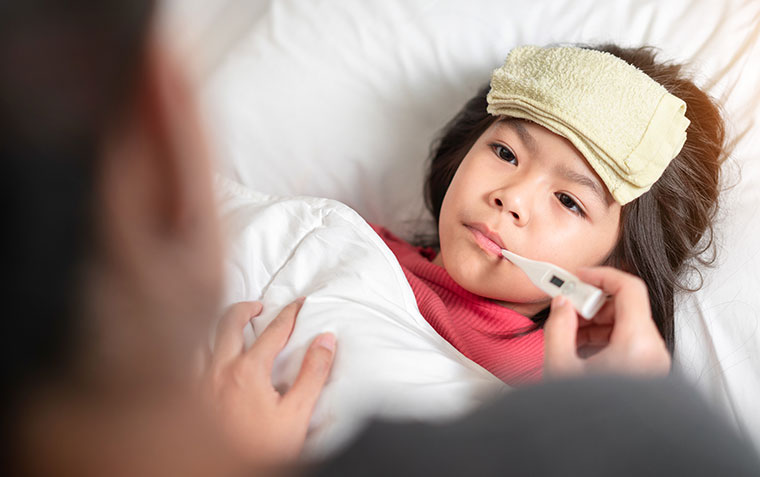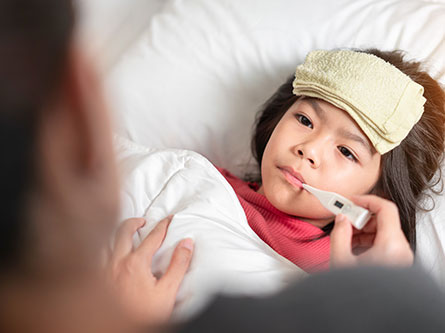
Fevers in children can cause a lot of concern for parents. However, it's important to note that fevers aren't necessarily dangerous. It means the body is working to fight off infection.
Children are more likely to get fevers and have higher fevers than adults. This is because their immune systems are still developing. Their bodies create more pyrogens – substances that can cause fever – for each new infection they come in contact with.
Our pediatricians answer frequently asked questions that parents have about fevers in their children.
What temperature is considered a fever?
A fever is considered to be 100.4° F or above.
What might be causing my child's fever?
There are many things that can cause a fever, including the common cold, flu, ear infection, stomach bug or urinary tract infection (UTI).
It's not necessarily a bad thing if your child has a fever. Fevers are a sign that the body is fighting off infection.
When should I be concerned about my child's fever?
Fevers in children are not always a cause for concern. But parents may want to check with their pediatrician if their child has a fever, and:
- is 3 months old or younger. Babies this young have immature immune systems and can have a serious infection without showing many signs.
- has a fever that lasts more than four days without knowing what's causing it.
- shows signs of dehydration. These can include no tears when crying, infrequent urination, dry mouth or tongue and sunken eyelids.
- is immunocompromised.
- appears very ill or drowsy.
- has severe headache, earache, urinary tract infection (UTI), sore throat or repeated vomiting and diarrhea that can't be managed at home.
Learn about primary care and why you should partner with a provider
Explore the differences between sore throat and strep throat
See our pediatric infectious disease specialists
When should I take my child to the ER for a fever?
In some cases, fever can be a sign of a more serious illness. Go to an emergency department or call 911 if your child has a fever and any of the following symptoms:
- Extreme drowsiness or sleepiness
- Stiff neck
- Rash
- Trouble breathing
- Can't stop crying
- Excessive drooling
- Difficulty swallowing
- Pain or tenderness in their abdomen (stomach area)
- Altered speech
- Trouble walking
- Blue lips, tongue or nails
About 2-4% of children under age five will have febrile seizures. It's important to note that not all seizures cause jerking movements. Some can cause a child to pass out.
If your child has a seizure, do not put your child on their side or put anything in their mouth. Call 911 if the seizure lasts longer than five minutes.
Learn when you should go to the emergency room (ER), urgent care or doctor's office
What should I do if my child has a fever?
Hydration is very important because fevers can cause dehydration. Children (and everyone) should be drinking more fluids than normal, especially water, because of the fever.
Parents should encourage their child to drink liquids throughout the day. If your child will only drink juice or have a popsicle, that's better than nothing.
Monitor your child's symptoms and how they're feeling. You can give your child medications to help reduce the fever.
See why it's important for you to drink water and stay hydrated
What can I do to treat a fever?
It's not always necessary to treat a fever. There's a common myth that if you don't treat a fever, it will keep getting higher. That's not true.
It's more important to pay attention to how your child looks or acts, as well as how long the fever lasts. Fevers usually follow the natural course of infection, which is typically one to four days. After that, call your child's pediatrician.
These two medications can help reduce a fever:
- Acetaminophen (Tylenol): This is safe to give at any age.
- Ibuprofen (Motrin): This should not be given to children under six months of age.
Give the correct dosage based on your child's weight. Pediatricians recommend that you alternate between these two medications to help keep the fever down. Be aware that confusion between the drug name (acetaminophen) and the brand name (Tylenol) can cause overmedication.
Can a fever cause brain damage in my child?
It's a myth that fevers above 104° F can cause brain damage. Only temperatures above 108° F can cause brain damage. It's very rare for the body temperature to climb that high from illness alone.
Is normal body temperature always 98.6° F?
Normal body temperatures can move up and down from one degree above 98.6° F to one degree below. Lower body temperatures can happen earlier in the day. Higher temperatures can happen more in the afternoon.
Learn more about fevers in children from our pediatricians
This blog was medically reviewed by Dean Blumberg, chief of pediatric infectious diseases.




